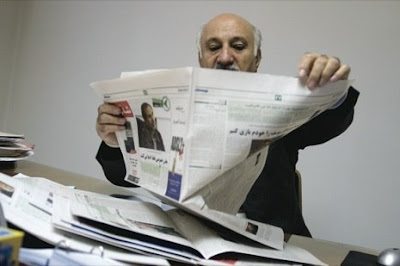
Came across this story in the New Yorker, a profile of a liberal Iranian economist called Mohammed Tabibian. Has stayed in memory because Iran, seen through Tabibian's eyes, reminds me so much of India.
Here are some nuggets that I really liked:
- Tabibian speaks with a lucidity and directness that is startling in a culture marked by allusiveness and elaborate courtesy
- In Iran the spectrum of economic thought, Tabibian joked, "runs from left to left". The so-called convervatives... talk of redistributing Iran's wealth, not of re-structuring its economy
- "The common morality was that if the rich give a part of their wealth to the poor, then the poor will be helped out. Many days and nights, in my imagination and daydreaming, I distributed the wealth of my family to the poor in my neighbourhood. Always my calculation came to the same conculsion: that such an imaginary scheme, even if it happens, makes us poor and the neighbourhood not much better off"
- Tabibian is not bothered by the negative example (of free markets run amok) unfolding in the West. "We are on two different sides of the spectrum. You need more regulation. We need less regulation and government intervention"
- The senior Iranian clergy at Qom "were nice people, gentle people, very concerned about morality and things to come from the other life". Their economic presriptions, however, were vanishingly vague: society should be prosperous, people should not be greedy
- After the Revolution, the Central Bank had only one clear priority, to abolish the interest rate which was deemed un-Islamic. And yet, no matter which policy the Central Bank pursued, interest quickly reappeared. A bank branch in Tehran would place a red car on its roof and announce that all depositers would be entered into a lottery for that car - a strategy that allowed the bank to pay a variable rate of return on its deposits. Bankers even found ayatollahs who would issue fatwas in support of their schemes
- The revolution had made education available to more Iranians. But there was no role for these people in an economy that depended not on productive industries but on the dispensation of oil-rents
No comments:
Post a Comment